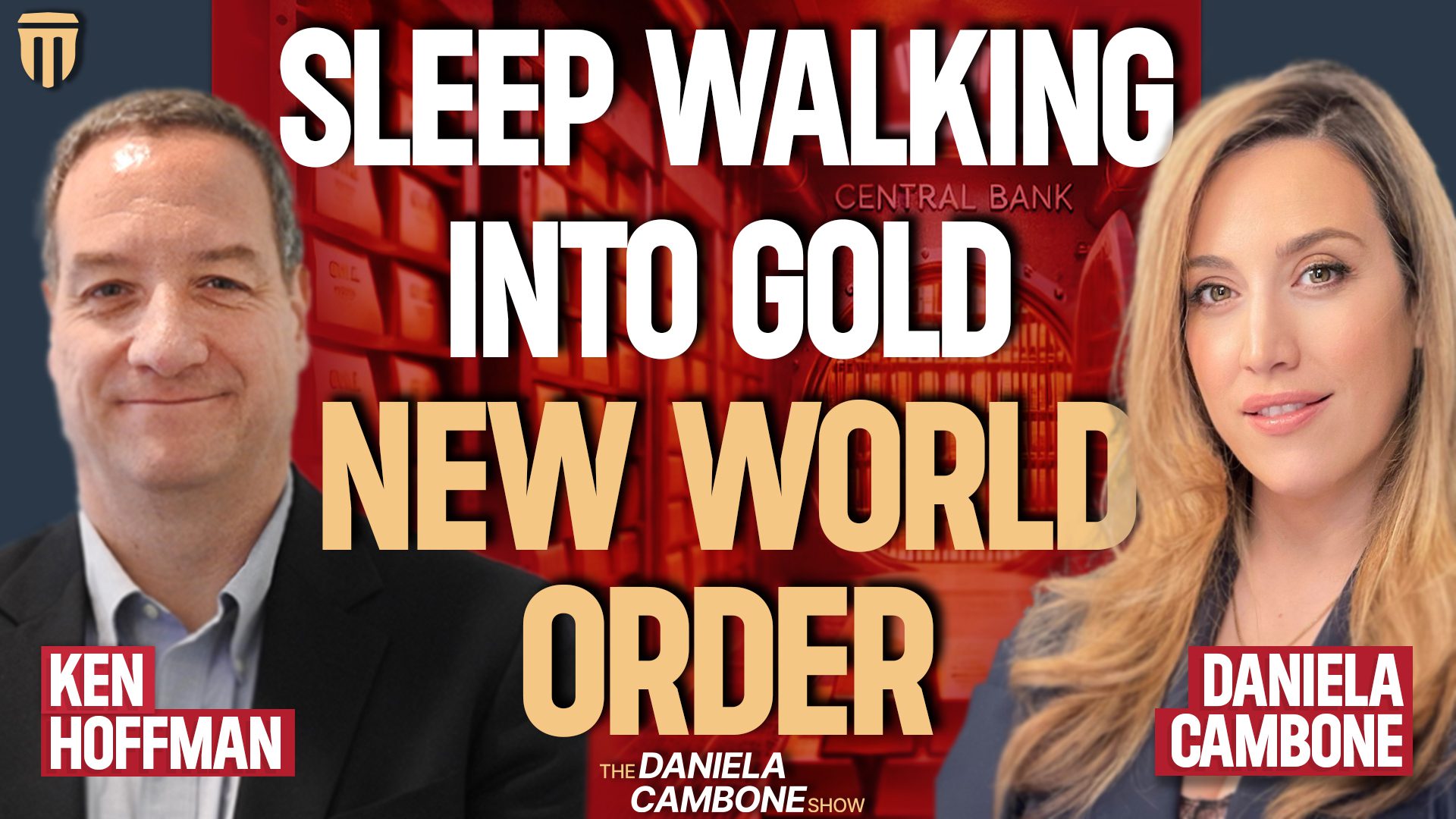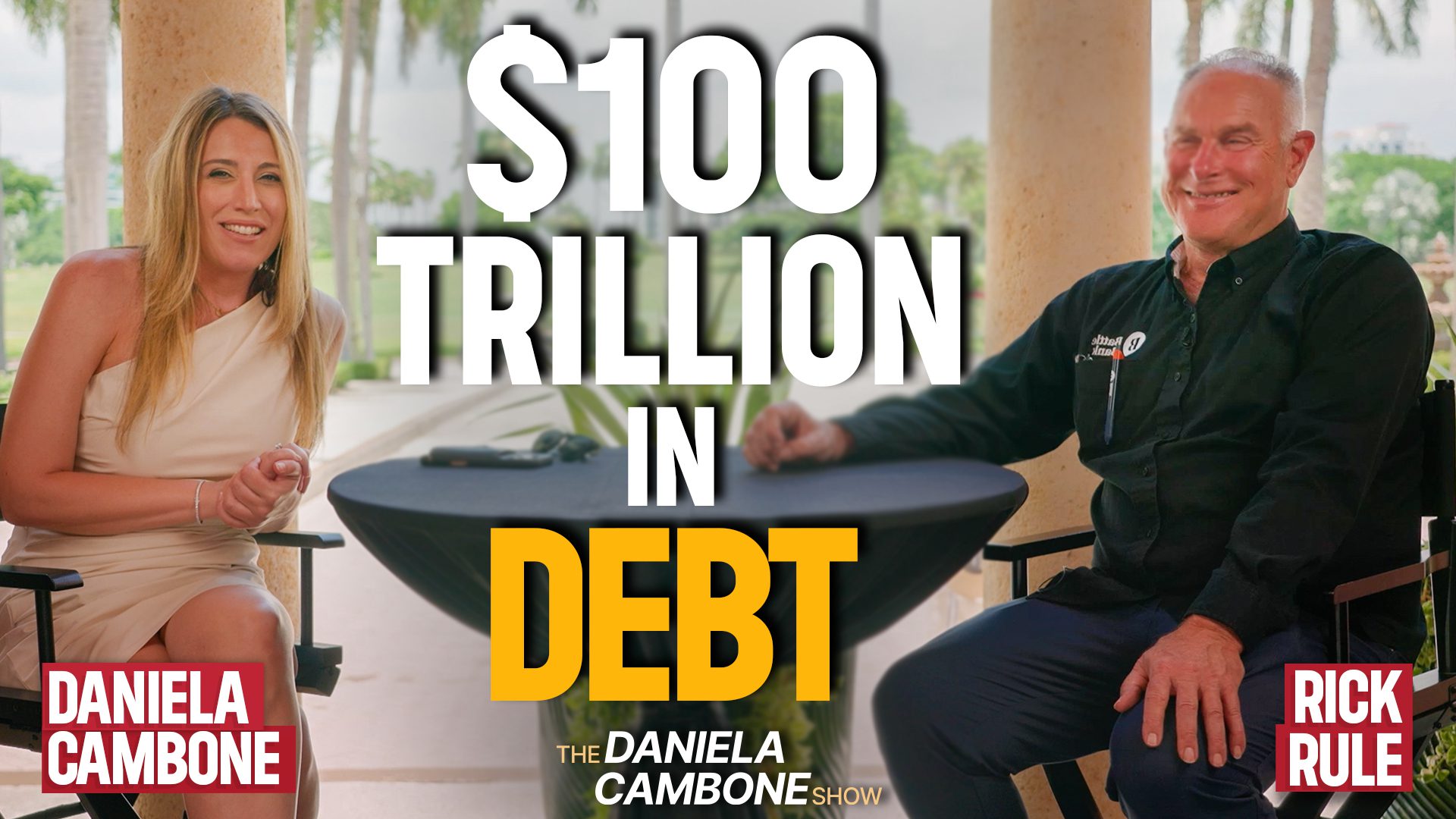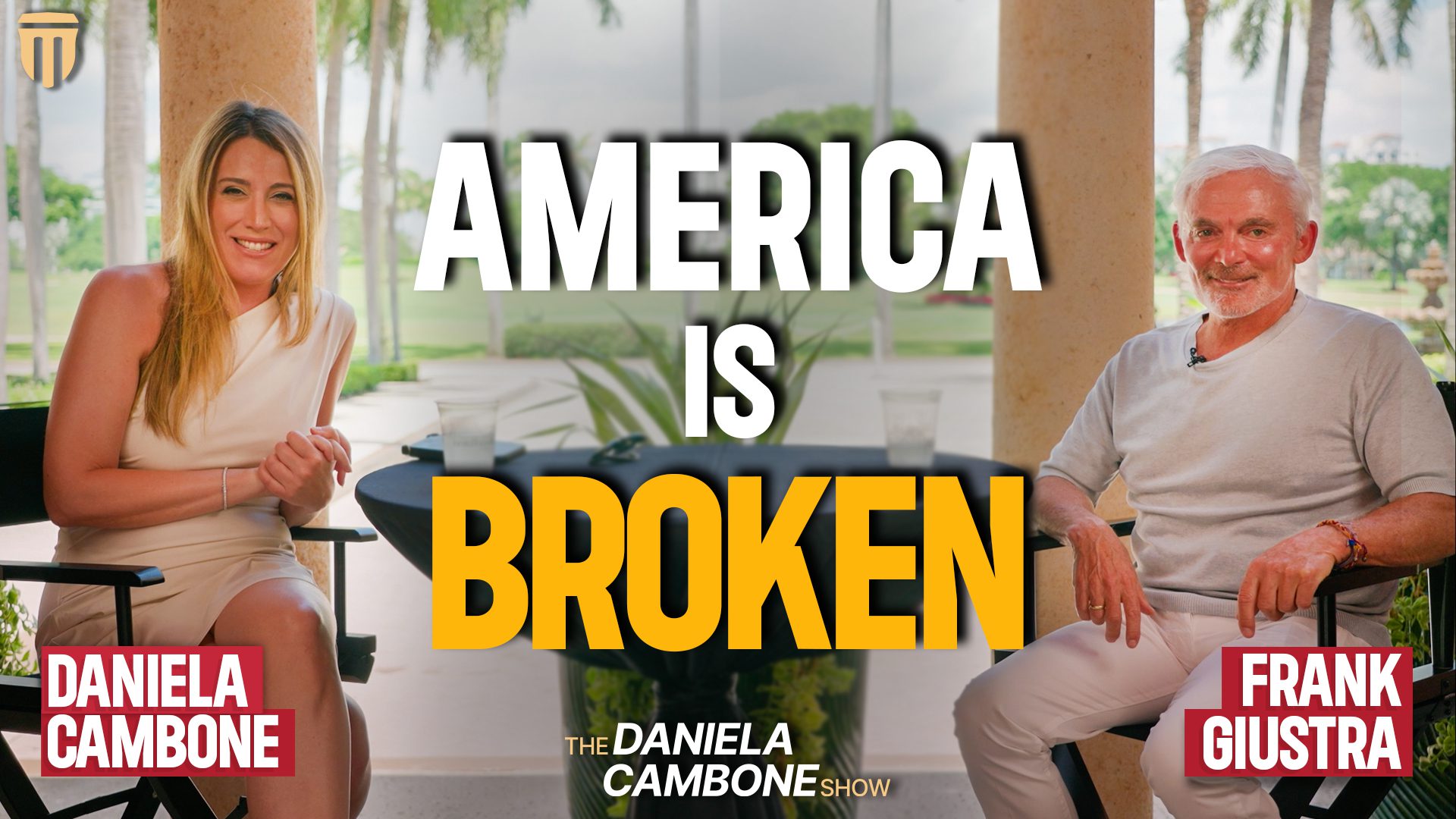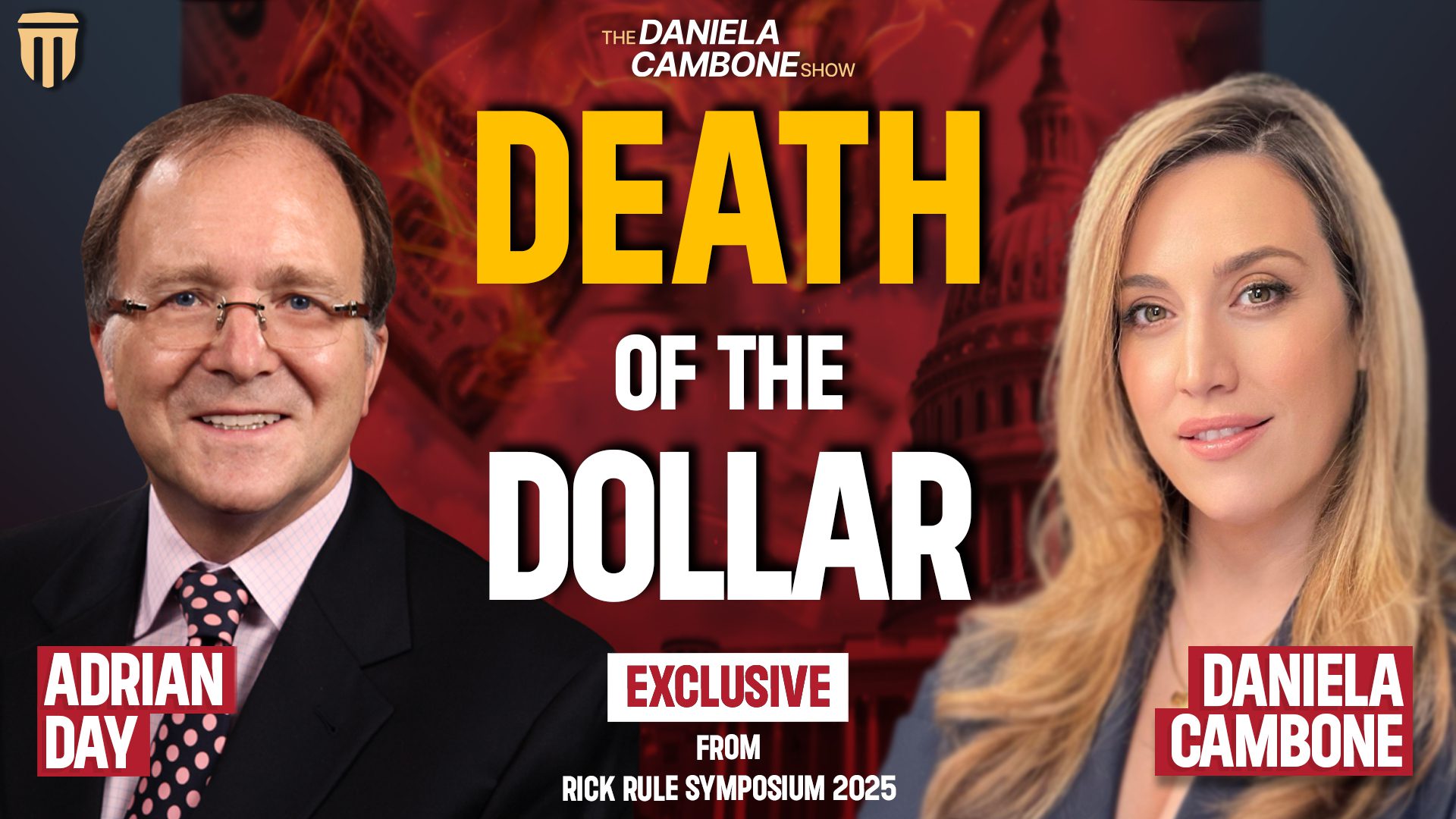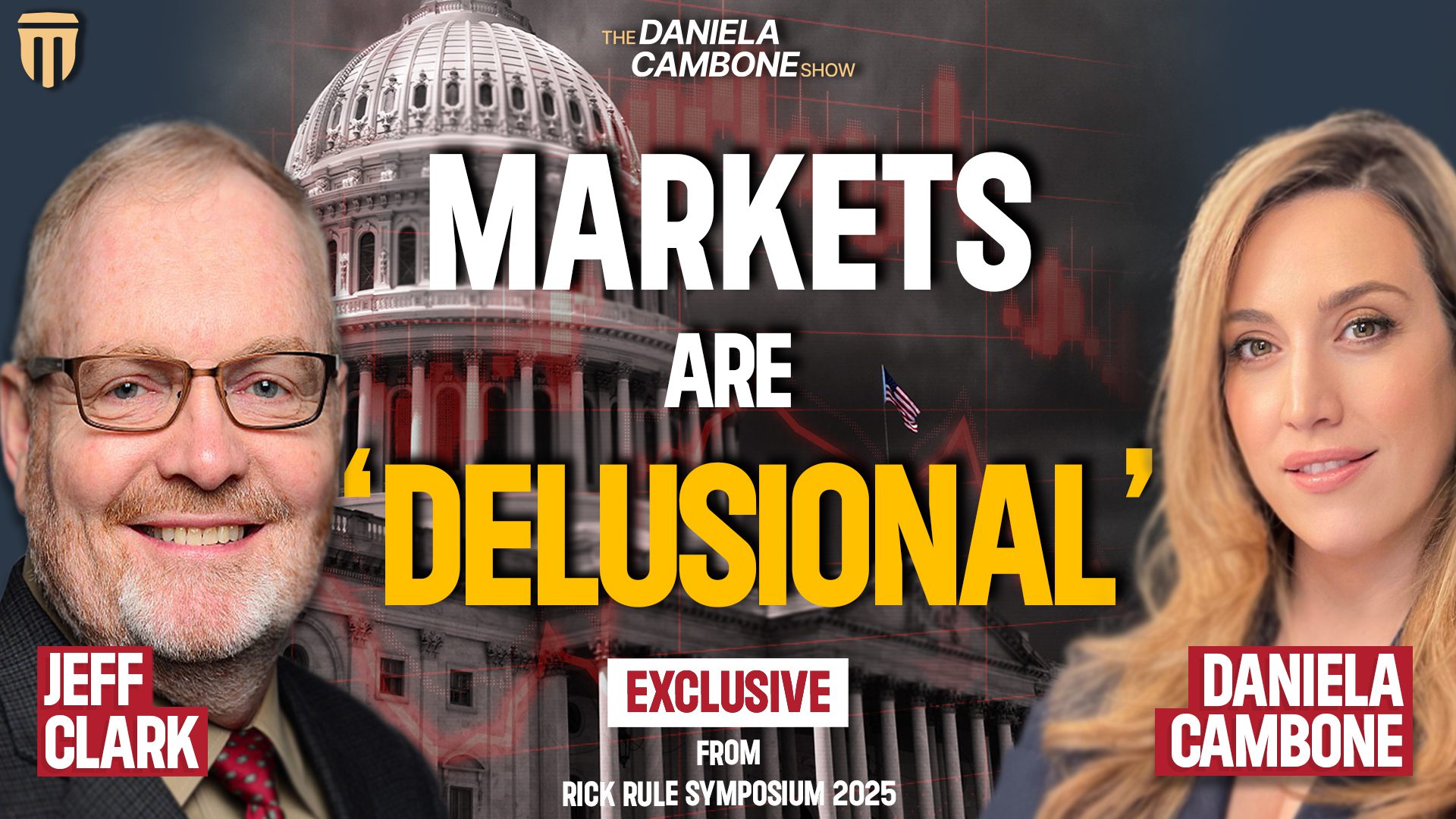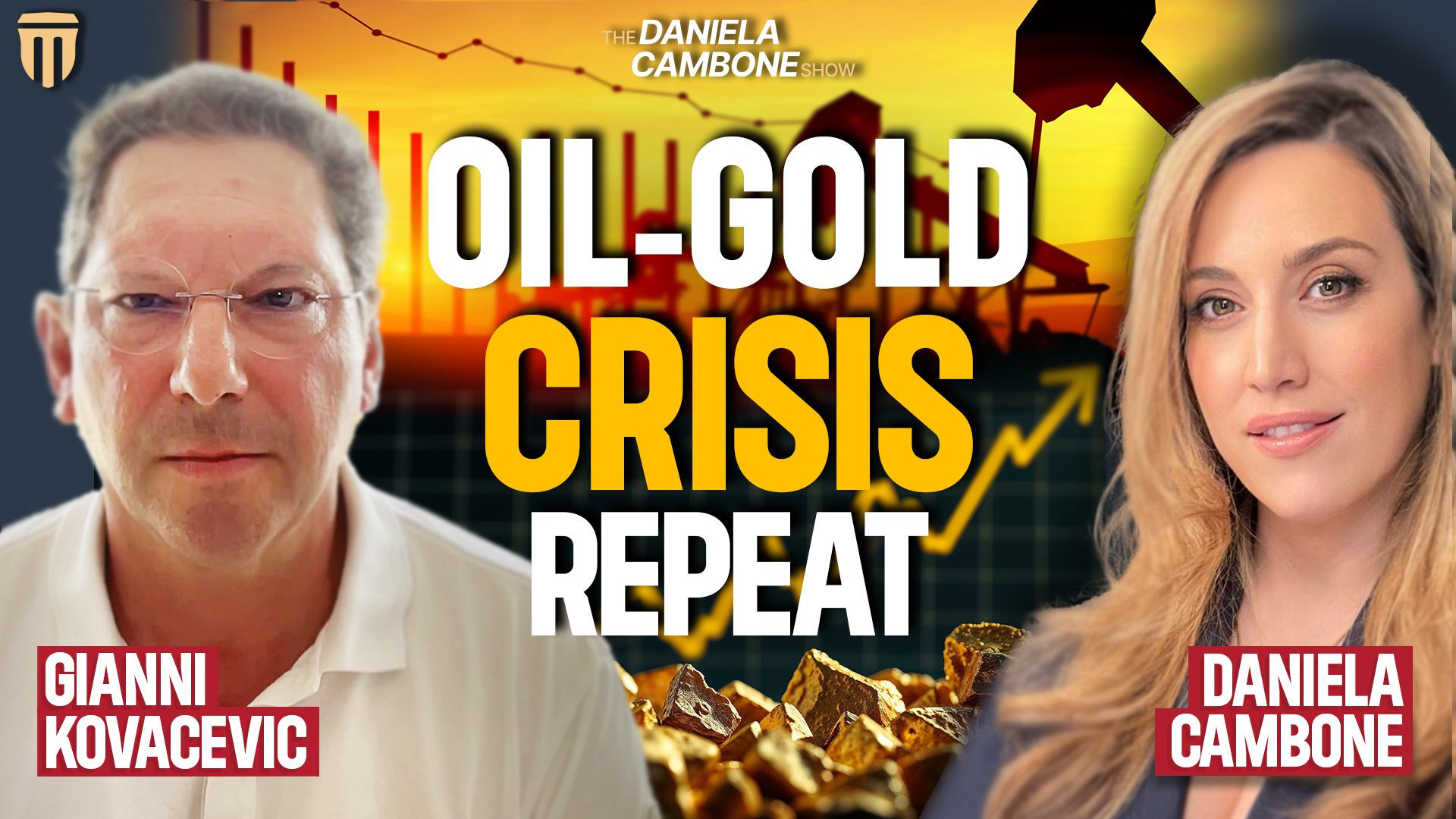America is in “A Bad Place”; Gold Can Restore Its Prosperity Says Trump Fed Nominee
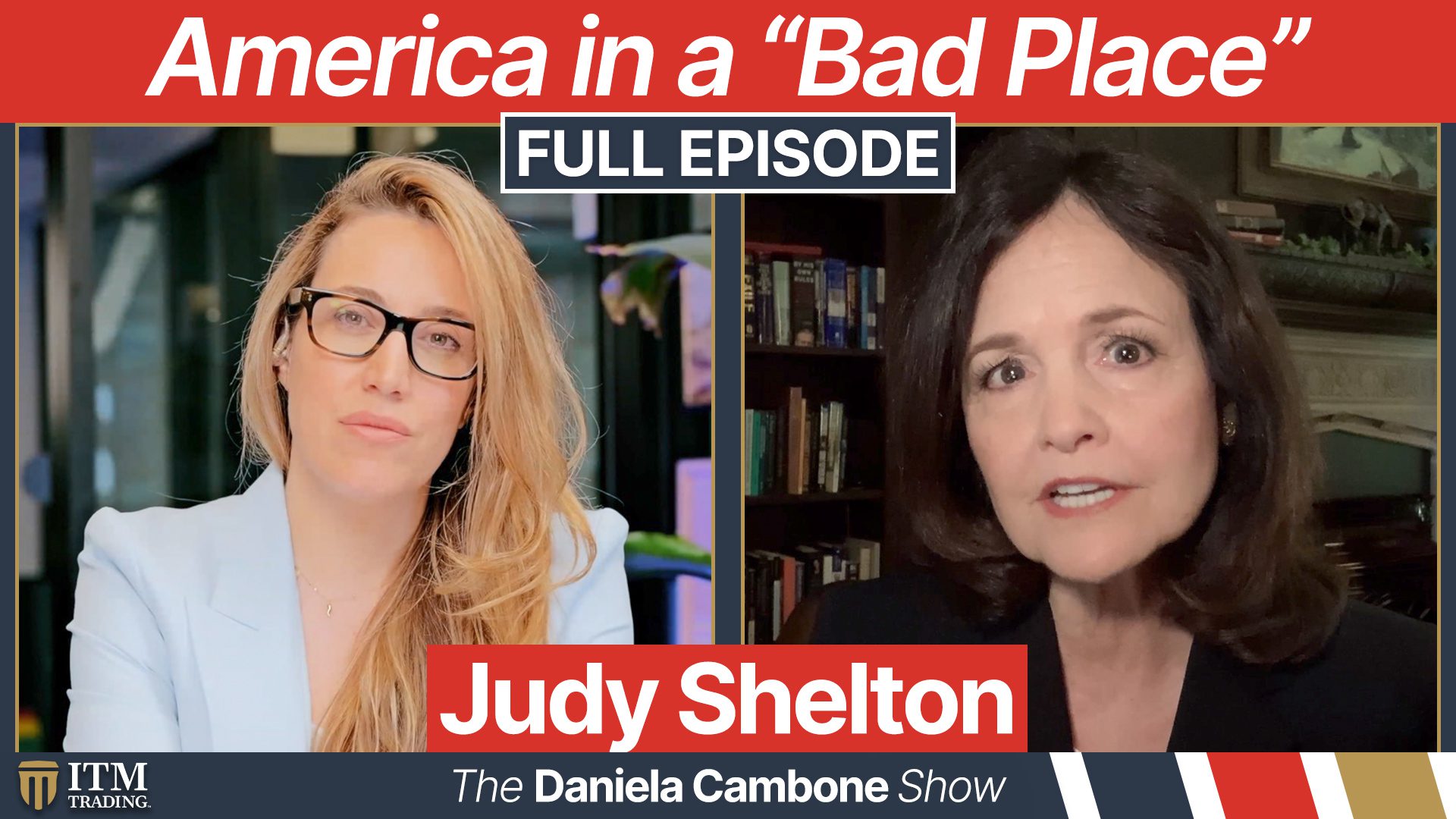
“You can’t have sound money without sound finances,” says Judy Shelton, monetary economist, author of “Money Meltdown,” and former economic advisor to Donald Trump. In an exclusive interview with Daniela Cambone, Shelton explains the rationale behind a gold standard argument, detailing how issuing a gold-backed bond may be the pathway to it. “I don’t know how people talk about free trade without addressing currency gyrations and how they impact trade,” she says. Additionally, she warns that the fate of the U.S. may be similar to what happened to the Soviet Union with insurmountable debt. “Is the US still going to be here in 50 years? At the rate of the unsustainability in terms of the fiscal and monetary situation that you opened with, I don’t see how.” Tune in for this insightful discussion on the future of the U.S. economy and the potential return to a gold standard.
CHAPTERS:
00:00 US debt cliff
3:20 Money should work for the people
6:06 Gold standard
14:03 Argument against returning to gold standard
17:26 Donald Trump
26:54 Inflation and current economy
29:59 Central banks accumulating gold
39:15 BRICS
46:48 Concluding words
TRANSCRIPT FROM VIDEO:
00:06
Hi folks, Daniela Cambone here for ITM Trading. Before we get to today’s exclusive interview with Judy Shelton, an advocate of a return to the gold standard, I want to just take a quick second here to remind you that if you have not reached out to one of my incredible colleagues over at ITM Trading, I really urge you to do so and book a Calendly appointment in the link below in the description. You might be like, what’s the Calendly appointment for? Well,
00:32
If you have any questions about owning gold or silver, physical gold or silver, or maybe you already own some, or maybe you just have some lingering questions, or maybe you’re just new to all of this and the content, you can book a free strategy session. I can promise you, you will find it extremely worthwhile. So you can do so in the description below of the video. And now let’s get to our exclusive interview.
00:57
Hi, this is Daniela Cambone and welcome back to the Daniela Cambone show. Absolutely thrilled to be with my next guest today. We’ve been communicating for so long on social media. So to finally be able to connect today after so many years is really, is really a high for me. Judy Shelton is my guest today. You may know her as a senior fellow at the independent Institute. She’s the author of the fantastic book, The Money Meltdown and her new book, Good as Gold, How to Unleash the Power.
01:27
of sound money. Judy, so nice to see you. Welcome to the show. Thank you, my pleasure. I appreciate that we finally have this chance to have a conversation. Yes, and I hope I get to, you know, pick your brain as one of the top economists in the nation on so many things just top of mind, not just for me, but for many in my audience watch watching with the big question, Judy, and I know it’s a jugger
01:57
monetary policy back on track from where we are. Just to put things in perspective for those watching, the Congressional Budget Office, which is nonpartisan, has predicted that in the next 10 years we’ll have another $20 trillion added to the already $34 trillion federal debt now. And there’s $100 trillion of baseline deficits going up to 2050. So at 5 percent interest rates, that’s completely unsustainable.
02:27
And how would the US dollar not be in crisis? So I throw this back to you, Judy. I mean, how do we come off from this cliff or on? We’re really in a bad place. I think you captured it well. One thing that’s become quite clear is no matter how many times the chairman of the Federal Reserve says that price stability is a responsibility of the Federal Reserve, it turns out that the fiscal stimulus can overwhelm.
02:56
the highest interest rate that you think the economy could tolerate. So I think that it really is a whole of government approach. We have to demand that government be fiscally responsible. And then I think we have a chance at least to move towards sound money, but you can’t have sound money without sound finances. And that is really the focus of your book. And I like how it says
03:25
that for you sound money, it’s a moral process. You say the US dollar should be a meaningful unit of account across borders. Money should work for the people. It should be, excuse me, a tool of measurement, but working for the people, I mean, this just seems like a notion that is impossible and improbable right now.
03:49
Well, that is where I would like to have more focus. And so that’s a major point of the book. I think it is a moral responsibility of the government. I mean, we have legal tender laws. We have to use this unit of account. And money is meant to be a meaningful unit of account that really measures value. It’s supposed to be a store of value, truly.
04:16
stable sound money that doesn’t have built-in obsolescence, even at 2%. The Fed would congratulate itself on 2%. But think in 10 years, you’ve lost 20% of your purchasing power based on money you have saved, based on America’s money unit. And I think that what has happened is government has just turned money into another economic instrument.
04:45
to achieve its own objectives. If you go back and look at what Thomas Jefferson wrote, his notes on the establishment of a money unit for the United States, the goal was to have a common currency to facilitate commerce, not to complicate it. People shouldn’t have to be sitting around listening to the morning networks talk about the latest inference from a statistic.
05:12
or from a comment made by a Federal Reserve official. Money should work the same for everybody, including people who have other jobs to do during their day, not just the cottage industry of monetary policy analysts. It’s really important to restore money as a meaningful, honest tool of measurement to facilitate the prosperity that comes from free market mechanisms. I think we still are a free market economy. We’re in danger of losing it.
05:41
but it’s that kind of entrepreneurial power and zeal and aspiration that we want to encourage. That’s where you get the prosperity that uplifts the whole society. So we need to give them proper tools and accurate price signals to make the best decisions about where to invest and where innovation is most needed. So talk to me about our returns for gold standard because you made headlines.
06:11
when you came out years ago, advocating for a return of a gold standard. How essential is it to return to some sort of gold standard to achieve a sound money process? Well, thank you for asking that. It was interesting for me as a monetary scholar, I was a senior research fellow at the Hoover Institution at Stanford University. I had a postdoctoral fellowship.
06:40
And I had studied a lot of monetary history, but when I was nominated to serve on the Federal Reserve Board, I had people saying, oh, she’s a gold bug. That’s like, that’s the worst thing in the world. I think it’s important to say, what can we learn from prior international monetary systems? I guarantee you people such as Alan Greenspan and Paul Volcker, both of whom very good friends of mine.
07:07
can easily talk about the relationship between gold and having reserves and the soundness of monetary systems. I remember one day there was a particularly vicious op-ed in the Washington Post about me denigrating me as this gold bug and I was putting out dog whistles to that crazy sound money community. And I sent an email to Alan Greenspan and said,
07:37
I quoted the first line of his famous article on gold and economic freedom, which said, there seems to be a hysterical antagonism against the gold standard, which we can understand if we realize the welfare status, just wanna transfer wealth and redistribute it as a socialist government would do. Very radical article he wrote back in the mid-60s as an acolyte of Ayn Rand. Well, he wrote back almost immediately,
08:06
If gold is so worthless, why does the US government and other major governments hold so much of it? So then I thought these people who are just pundits really don’t appreciate what the people who have been in the arena know about soundness. So what I’m proposing in the book is to set up a barometer, set up a barometer so people can see what if we really did have sound money?
08:36
What would be the difference between, say, a treasury instrument that paid off in gold at the option of the bondholder compared to a traditional treasury certificate? And I think to maybe boil it down, you could say, what would you rather have today? $2,400 US dollars or an ounce of gold. Let’s say that’s today’s price. I think people might say, well, I’m indifferent. Because
09:05
$2,400 equals an ounce of gold. Well, what about 50 years from now? Would you rather have $2,400 US dollars or an ounce of gold? And I think most people would say obviously the gold, obviously the gold, because they know the dollar deteriorates. So we start with that. Good is gold. We have had the classical international gold standard. We have had a managed.
09:33
gold anchored system under the Bretton Woods approach. So why can’t we have money that’s as good as gold? Even if we say that money evolves, money is innovative, maybe the cryptocurrency market is rising. There’s certainly a lot of people who are interested in that. So here’s what I’m suggesting in the book.
09:59
It would be a bold proposal under a president who sees the imperative of setting up a marker in favor of sound money. The U.S. since 1973 has been carrying 261 million ounces of gold at a price of $42. I’m always afraid that the next president is going to say, oh, let’s sell it. Why do we have it? Bernanke was once asked.
10:27
when he was chairman of the Federal Reserve, why do we have gold? He said, oh, it’s just residual. I remember, I think it was, who was it? Ron Paul, he was a member of Congress at the time. And he has- Right, right, right, right. Well, then why don’t we hold diamonds? And he kind of made that point. What I’m saying is that those holdings are worth over a half trillion.
10:58
I would like to lock that up as collateral. We haven’t used them in 50 years. Why not issue a bond on July 4th, let’s say, of 2026, under a new president, hopefully, if I may say, that would mature in 2076, the 300th anniversary of the Declaration of Independence, and have that bond be issued by the U.S. Treasury.
11:27
redeemable in gold by that collateral that we set aside as a gold we’re carrying. First, we can take a windfall profit on that gold and let’s say we set the price either at today’s price saying that the dollar should be as good as gold or if people really say no, no, 2% is fine. I don’t think so. I don’t think the Fed…
11:52
knows how to hit 2%, they’ve gone under, they’ve gone over. I don’t give the Fed that much credit for finessing it. But let’s say they accept 2%. We’ll then add 2% annually for 50 years compounded to the price of gold. And let that be the face value of that US official treasury 50 year bond. And then let it be at the option of the bond holder to either take the dollars or the gold.
12:23
And I think as people look at that instrument and how it’s priced and what kind of an interest rate it yields, my guess is such an instrument would be oversubscribed just for the novelty even of it. What if grandparents bought it for the kids? But it would be an investment because you’re asking people, dare I say it, is the US still going to be here in 50 years? At the rate of the unsustainability.
12:49
in terms of the fiscal and monetary situation that you opened with, I don’t see how. I started my career analyzing the internal budget and monetary system of the Soviet Union. I had a very academic manuscript that was going to be the impact of Western capital on the Soviet economy. Well, that turned into a commercial book called, because the people at the Hoover Institution insisted that it be published as a policy book, The Coming Soviet Crash.
13:20
It came out in January 89. By December 1991, there was no more Soviet Union. Think our biggest enemy during the Cold War, there was no more Soviet Union. They went bankrupt. So it can happen. And I don’t see that for the United States, but just because the Soviets hid their growing budget deficit and the damage that was doing to their money,
13:50
to their financial situation and to their economy, bankrupting it, just because the US is more transparent about it. If we don’t do anything about it, we’re in the same boat. What do you make of the, you know, the criticisms that are always repeated when, well, we can’t go back to a gold standard because of the constraints it places on the government, because of the volatility that it places, or that there wouldn’t be enough gold, Judy, to return to a proper gold standard.
14:20
Well, I always think compared to what? Compared to 9% inflation, compared to money that has caused the economy to make the Federal Reserve, an independent government agency, so powerful, so dominant, so political. I mean, I really have to say compared to what, but I would also remind people, I mean, the way, when the United States defined the dollar.
14:50
in terms of a specific weight of gold and a specific weight of silver, they didn’t say, and we’re gonna issue paper money and redeem it in gold and silver. They didn’t have the gold and silver. It was a way of saying, this is what a dollar is. It was a way of joining an international monetary system. By the way, on this gold bond idea that I wanna put forward, I can well imagine that if the United States
15:19
was the leader in this regard and said as a sign that we are going to address the need for sound finances and some money, we’re issuing a 50 year official treasury bond redeemable in gold at the option of the holder. I think other countries would do it. I think China might be the first one to do it. The European Central Bank has huge gold reserves. Most major central banks have been accumulating gold.
15:49
Let other countries do the same thing. Issue 50-year bonds redeemable in a specific weight of gold key to a fixed exchange rate with their currency. You have the beginning of a market-determined new international monetary system which would give us a level monetary playing field. I don’t know how people talk about free trade without addressing currency gyrations and how they impact
16:17
trade, how they allow people to cheat on exporting. The beginning of an international system could be if the US was a leader here. So when I hear people say, oh, you talk about gold and they brand that as if that means you’re not serious. I don’t see how you could be more serious. You’re saying this is less serious than an unsustainable approach to finance and
16:44
are money itself. Sometimes I hate to say monetary policy. It shouldn’t be about monetary policy and the latest decision from 12 people voting eight times a year. It should be about the money itself. Stable money. I mean, even the Fed, it has given itself the mandate. Well, it says from Congress, but maybe Congress should never have done that. But stable prices, that’s an oxymoron.
17:12
The Fed at best is pursuing stable inflation. So it’s undermining the very idea of the dollar as a stable store of value. So three key points just based off of what you said. I wanna get back to China, why central banks buying gold. But this idea of yours, we know you were an economic advisor to President Trump.
17:39
In his last campaign, he floated the idea of a return to a gold standard. We see RFK talking of, you know, US dollar backed by gold or possibly Bitcoin. I mean, have you, have you discussed this idea? Can, can you, can you disclose whether you’ve discussed this idea with any of the current presidential candidates? I don’t think it’s, it’s wise to talk about such discussions.
18:08
When I had my interview with President Trump, the same day Chris Waller did, we took turns entering the Oval Office and meeting with the President, after which he tweeted that he was going to nominate me for the Federal Reserve Board. We never talked about interest rates. We never talked about how I might vote or even the Fed itself. He was very business-like. He only talked about appropriate
18:38
issues. He had my resume in front of him. He had an interview. I’d done a weekend interview in the Wall Street Journal. He was interested in my views. I think that people can see publicly. If they go back to, I believe it was September of 2011, Trump, who was not running for anything in those days, did something I noticed. He said,
19:05
He did not like the way the US government, that would have been under President Obama, was treating the dollar. He thought they were cheapening it. So he took as a deposit on building space in New York, three kilo bars of gold. I think it amounted to something like 100,000 at the time. And he not only did that, he had a press conference about it. He says,
19:34
doing this because I am showing that we need to have money we can believe in, money we can trust. I don’t like the way the government is treating the dollar like it’s just the unintended consequence of fiscal and monetary policy. And he made quite a statement about that. I instantly thought if he ever runs, he could address that issue, which I think is very important.
20:04
I mean, what worked under President Reagan, who also wanted to have gold backing for the dollar, he cut a commercial as he was campaigning for president saying, unless we return to some form of gold backing for the dollar, we’ll never have currency we can trust again. And he said, my goal as president will be to have the US dollar be the most trusted currency in the world. We’ll never regain price stability until we restore some form of gold backing to the dollar.
20:33
As president, my first priority will be to make the dollar the most trusted currency in the world. It’s very powerful. He said governments cause inflation, not labor, not business. I thought that was a powerful message. I worked with Jack Kemp. He also, he was, he was ridicule for being Mr. Gold Standard. You know, the irony, it’s a very liberating.
20:59
in the classical sense of liberal economics, of empowering individuals, very liberating approach to money. I think what we have now is a system based on monetary favoritism. I mean, if you already own financial assets and the Fed is conducting policy that increases the value of equities, you’re doing great. Think of the whole time when we had near zero rates. If you were just a
21:29
person who had savings in your local bank, and you were very good about it, and responsible, and planning, and putting a little in every week. I mean, I used to say monetary policy was making suckers out of savers. And again, when Trump was campaigning initially, he said, as a developer, I love low rates. I love low rates. He said, but it’s so unfair. It’s so unfair to savers.
21:56
And that’s where you get into the morality issue. I mean, one thing it’s American values, equal treatment, equal justice. So if you’re earning money, it should work for you the same way it works for anyone else. But I think the idea that it undermines, during the zero interest days, you’re undermining the moral virtue of saving. If people don’t save and provide that seed money, capitalism cannot succeed.
22:25
You have to have real money. Someone has to say, instead of consuming it, I’m going to save it because then it can be used, that seed money for a greater future economic harvest. And it’s gonna compensate me, it’s gonna fund some entrepreneur, it’s gonna bring innovation, it’s going to increase productivity. What you want, what you want is sound money that’s financing the real economy.
22:52
That’s financing productive investment, not just being used to arbitrage financial, quick silver opportunities in financial markets. I think the increasing financialization of the economy is doing a disservice to people who have real skills and who wanna create real wealth. We need to get back to money being the measure. And that’s why I’m not saying we go on this gold standard,
23:21
We don’t have the gold. I mean, just the Federal Reserve notes outstanding are greater than that total 261 million ounces. That would be just paper money. I’m not saying the government can back claims. The government can’t create all the claims. I mean, every time you take out a bank loan, you’re creating money. So what you want is a system that’s more organic. I don’t think, I think the people are well-meaning and smart who serve on the Federal Reserve Board.
23:50
I think I would have liked participating in that, but I would have really fought the agenda. I think that it’s too focused on tons of information to make a very simple decision. They really have the one tool of raising or lowering interest rates, and the way they do it now is so removed from the real market. It used to be in the old days that to raise or lower interest rates…
24:18
The Fed tried to influence the rate at which banks loan money to each other. And that was part of the required reserve system. Today, there are no required reserves. Banks don’t need to keep a certain amount of cash at the Fed. That’s why they keep thousands of times more than they ever did under Volcker, because now they get paid to keep cash sitting at the Federal Reserve. 3.3 trillion is sitting. So the only decision.
24:48
members of the Federal Open Market Committee, the Fed’s Monetary Policy Decision-Making Committee vote on, is whether to raise the amount they’re paying commercial banks to keep the money sitting there doing nothing. And they state very clearly the goal of paying interest on those cash reserves held by banks at the Fed is so they don’t lend them out to customers because they won’t at a lower rate than what they can get for no risk.
25:18
from the federal government. They’re getting paid by the treasury a very high rate on cash with zero risk. So that money to me is a shame. It’s sitting dormant. It could be funding ways to increase supply. I think that’s a much better way to bring down inflation than trying to kill economic activity. What we’re seeing is not only is that ineffective what the Fed’s doing, trying to discourage economic activity, that’s the way they try to.
25:48
reduce demand, they don’t address supply, they don’t increase supply to reduce inflation, they want to decrease demand. And they’ve seen that it takes a lot to suppress demand, but as the Fed raises rates higher, and we still have inflation fueled by fiscal spending, what you’re really seeing is a transfer of power from the private sector to the government. Because the private sector says, I can’t pay.
26:17
9, 10% on a commercial bank loan. I can’t pay that. So I can’t expand my business. I can’t hire new people. That would have expanded supply for the economy and helped to bring it out inflation. The private sector can’t, but the government says we don’t care. The treasury pays at auction, whatever it takes to get the money it needs to pay for the expenses in excess of the revenues that the government has.
26:46
has committed to spending. And I will always take private sector decisions about how to spend and what to invest in over a managed industrial policy carried out by the government. Feeding the banks, ignoring the citizens who just want stable prices in this environment, Judy.
27:10
That’s it. That’s it. And the irony is, you know, the Fed has a program called Fed Listens and they went around the country. Right. They don’t listen. Even when inflation was under 3%, it was just starting to rise and it was during COVID and after, and people started coming back. And so they went around and very somberly said, we’re really listening, you know, we’re the people’s Fed.
27:39
And they gave a questionnaire. They said, do you think it’s more important to have low inflation or maximize employment? And here are people, they said from even distressed communities, they were trying very hard to be kind of socially correct. And people said, low inflation would be better. Low inflation’s more important, and they couldn’t understand.
28:08
Why for so long the Fed was saying, our problem is we can’t push it up to 2%. So we’re buying massive quantities of government debt. We’re trying to flood the market with liquidity, with cash, and we can’t manage to push it up to 2%. That brought about then the new framework for monetary policy and all of these, I think, shows the presumptuousness.
28:35
that people in Washington could finesse the money supply. I just, I don’t believe it. And there was just an interview with Neel Kashkari, who certainly has the monetary policy credentials. And he said, I was very surprised. I talked to people, low income people, and asked them what’s more important that we fight inflation or that we maximize employment, because there’s this…
29:04
ridiculously simple trade-off still in people’s mind, that old Phillips curve, that the higher the rate, the lower the inflation, but the higher the rate, that has an impact on employment. They think it’s a direct trade-off. Well, Kashkari was amazed that the people at the low income part of the American economy were saying, if I lose a job, I have a network of people. I’ll find another job.
29:33
I’m resourceful. But if we have inflation, the people I usually count on to help me get through economic hard times, they’re being hit also. Inflation hurts everyone. So they’re not in a position to loan me money, to help me. And so again, the money has to work for the people. And I’m very radical on that count.
29:59
I want to get back to something you really hit the mark on when, you know, talking about this negative connotation that surrounds, you know, liking gold or talking about a gold standard or even the term gold bug. And yet many ignore the, the, you know, what’s obvious is that central banks, like you say, Judy keep accumulating gold.
30:26
You know, they’ve been on a crazy spree. We saw China 18 straight months of accumulating gold. So the question is, why? Why do you think central banks are hoarding all this gold? I think bottom line, Daniela, it is a acknowledged bulwark that the people who are really in the arena in monetary policy, central bank officials around the world recognize that prior monetary systems come from…
30:55
from a gold anchored approach. And they still recognize that gold is a real asset. And much of what they create is almost an illusion. Much of monetary policy is based on money illusion, making people feel like they’re gaining, they get a nominal raise. The whole idea of a 2% inflation target is that you could have an economy decline and everyone might
31:25
have to take say a 1% cut, but if you have 2% inflation, you can actually give everyone a 1% raise and they think they’re ahead of the game, even though they’re now losing in terms of not being able to keep up with the inflation. I think that’s a basically very dishonest approach. On China, we know China’s aspirations. They saw that the US kind of became the center of the universe when the US was the nation left with the most gold.
31:55
after the interwar period between World War I and World War II. And at the Bretton Woods Conference in July of 1944, the war was still going. But it was becoming clear that part of U.S. policy and even encouraging the Western allies to keep up the battle and win was based on saying, we’re never going back to the 1930s. We’re never going back to the beggar thy neighbor.
32:24
chaotic currencies, the collapse of international trade, the cheating through currency depreciation, we’re going to restore a solid foundation so that investment capital trade will be based on authentic price signals on a level monetary playing field. And that system was based on a US dollar anchored to gold. Not all countries would have to have gold back currencies.
32:52
and it didn’t extend to individuals. That was kind of a failing of it. It wasn’t like the classical gold standard where an individual had the right to convert from currency to gold. Under the Bretton Woods system, only foreign central banks had that right of convertibility, but that was powerful. If they thought the US was creating too many dollars, they could redeem those dollars at the rate of $35 per ounce of gold. So…
33:20
There’s no question that system brought about the for 20 years, huge increases in productivity, huge increases in GDP growth, shared prosperity, it increased trade, it increased economic performance around the world. In France, they called it the 30 glorious years. In the United States, it certainly worked
33:50
us up until we kind of blew it fiscally. We were financing guns and butters by the late 60s. We had a war going on in Vietnam. We had social security and government entitled programs growing like crazy. We were running deficits and having talked with Paul Volcker many, many times and at
34:20
on August 13th, I think, 1971, maybe off a couple days. And he said, we have to change the rate of invertibility. I think France and Britain were about to send over excess dollars and say, we’d rather have the gold. I mean, that becomes an automatic limit to the money supply worldwide. So that’s the value of convertibility.
34:46
It is organically controlled by the participants. They say we’d rather have the gold. Well, that constricts the money supply. That’s how you respond to your sense, your sense that it’s getting too foamy out there, that there’s too many dollars being printed. You leave it up to the players. So at least in that situation, the government players were saying, you’re printing too many dollars. We’ll take the gold instead, and that’ll constrain your money supply.
35:15
We just needed to change it to maybe $37 per ounce of gold, maybe 38. He never thought that was the end of the system. He never thought that. He loved that system. Read his book, Changing Fortunes. He grew up in that system as a treasury official, as the undersecretary for monetary affairs. We now call that position the undersecretary for international affairs because it had to do with a stable dollar worldwide.
35:46
Now getting back to China, since you brought that up, but I think this was a good preface to that discussion. The man who was briefly the chancellor of the Exchequer under Liz Trust, conservative British politician, she got drummed out really by the pressure from their central bank, the Bank of England, when she proposed in conjunction with Quasi-Quartang, a pro-growth supply side agenda.
36:15
lower taxes, the urge saving and investment and work, fewer regulations to unleash entrepreneurial power of creative, productive investment and activity, better energy policy, better trade policy. And she got hammered by the central bank. And that ended up not lasting long. But something about that Quasi-Quartet, he had written an op-ed.
36:44
that was published by the New York Times. It’s worth looking up, suggesting that the world needed a new international monetary system. And he said, if China went on a gold standard, they would be where the United States was in 1944. They would be the one. Now, do I think that’s part of China’s interest? I do. I also think that we see the BRIC countries trying to set up an alternative to the US dollar.
37:15
Now I say being the dominant reserve currency is not something you want to lose. That is our greatest instrument of soft power around the world. And I heard that from Robert Gates, former defense secretary. That is very powerful for us. We want to retain that. And it looks like we can, but we sure don’t want to jeopardize it. And we now see China and Russia.
37:45
and other countries. I think Saudi Arabia is in the mix. We need to watch them. Argentina was planning to join that BRICS approach with a new currency. And I hope the US realizes what a great potential strong ally we have for Western values and Javier Millet, their president, Argentina’s president, stop that.
38:14
in its tracks. Argentina would have joined in January of this year, and he said no. And they’ve gotten loans from China to pay back the International Monetary Fund. So it took a lot of courage for him to say, we don’t like those values, we don’t want to go that route. But yes, I think the BRIC countries would love to have a competitor to the dollar. And if you want to know the only other global currency in the world, again.
38:43
Don’t ask the pundits for the Washington Post or the New York Times, ask Alan Greenspan. He says that gold is not only a global currency, it’s the only real global currency because it’s not controlled by any central bank. And I think he knows a thing or two. He was one of the longest serving.
39:04
chairman of the world’s most powerful central bank.
39:10
I’m happy you brought up that point about the bricks, Judy, because oftentimes I, you know, I’m a little shocked when people quickly discount the bricks saying it’s just, you know, it’s just a nice ideology. You won’t ever really cut anything, won’t really ever come from it. But you know, every month that passes by, like to your point, we see more and more countries adding. So yes, alone, they may have weak currencies and they may be weaker players. But together,
39:40
they are becoming a dominant force. That’s right. And China did a very clever thing. They set up in their free trade zones, the gold futures markets in the last few years. And that enables Russia and other oil supplying countries to sell gold to China and immediately get paid.
40:07
a new one that’s convertible into gold futures instruments. So that’s a way for China to carry out trade, especially energy trade, and at the same time, elevate that platform as one of the world’s strongest platforms for gold futures. Now, it’s not the same as a gold standard. China’s not saying here we’re linking our new one to gold at any fixed rate.
40:36
but they are making it very easy and almost instantaneous for any country that wants to do business with China to have the financial arrangements based on an instrument denominated in gold futures contracts, which might be acceptable to these other countries. So I think that was quite clever. What I see is if the US were to take the lead.
41:04
See, the day I dread is when China says, we are doing a gold back currency, and suddenly people are very interested. I want the US to be the leader. Yes, we’re the dominant currency, and not only do we believe the United States is going to get stronger internally, in terms of its internal economic, fiscal, and monetary soundness, we’re gonna place a bet on it. We’re putting out there, we’re putting our goal.
41:33
all the gold we hold as an official gold held by the United States backing a 50-year bond. And all we have to do with that bond is it has to perform better than the nominal treasury bonds, the traditional treasury bonds. And let’s, you know, we have tips, we have treasury inflation protected securities, and all they do.
42:03
put together under Robert Rubin, when he was the Treasury Secretary in 99. And he said there are people who are concerned about inflation and they don’t wanna buy a government bond and it pays them 4% and then inflation is 5% and they lose money. So you come up with an inflation protected security that gives you…
42:27
not just the interest rate you were promised, but it then gives you effectively a cost of living, a COLA adjustment to compensate you for the inflation. Well, that’s what this instrument would be. Only instead of saying I wanna be compensated in terms of a cost of living adjustment for inflation, you’re saying I see gold as a surrogate for the real economy. I want real purchasing power. I wanna be compensated in accordance with what is represented.
42:57
by having a convertibility privilege for a specific weight of gold. So it’s a tips bond, it’s inflation protection. It’s just reimbursing you in a different form of a government security, not in dollars. It’s reimbursing you in US held gold. And I think what you could see, let’s say it was oversubscribed. Not only could you get the windfall profit from marking up from $42 per ounce of gold
43:26
$2,400, get over that half trillion. But you could also begin to set up this barometer, as I say, that people could say, what is the yield on that? If it’s oversubscribed, I mean, the government could be borrowing at a negative rate. It could be the best way to raise some capital. It’s not enough to cover the deficit, but it’s not nothing.
43:54
It’s real money when you think how hard fought bills are that spend tens of billions of dollars or hundreds of billions. We’re talking about over a half trillion and maybe more if gold continues to go up. But that will be interesting. That will be interesting to watch. And if there is over demand, then I think this little spark of for the first time in 50 years, the US government having some kind of gold backing for the US dollar.
44:24
I mean, since the end of Bretton Woods, restoring it under a new president, what was lost, what Reagan wanted, but under a new president, just this initial program, you could see the private sector say, well, if there’s so much demand for it, some bond company or hedge fund could say, we’ll combine treasury securities with gold futures. We’ll give you the same deal. And that could multiply the impact of…
44:53
of what would be occurring as people are measuring their faith in the value of gold relative to their faith in the value of government and officials at the Fed and at the Treasury for monetary soundness. And that would be out there. Just like the TIPS yield measures the aggregate expectations about inflation among the investment community, the yield on, I would call them Treasury trust bonds, the yield on Treasury
45:24
Treasury securities would also be at the very least an invaluable tool to the Fed to measure aggregate expectations about not just inflation, but the difference between what the financial markets are doing and what the real economy is doing, how the US dollar is stacking up relative to other currencies, the beginning of exchange rate stability. If you have multiple gold back…
45:52
offerings of different currencies. And I think it could be very useful and a way to say to Congress, look, the difference between people’s confidence in a dollar that’s as good as gold compared to their confidence in the dollar that you farmed out to the Federal Reserve, but that you’re complicating their mission through fiscal recklessness, I think that’s the beginning of taking it back by the American people.
46:22
and saying we deserve sound money, we deserve a dollar, a money unit of the United States that we can trust. That is an accurate, reliable measure of value in a free market economy, and that’s what we want. It would be, it could be very powerful to do that initiative. And I thank you for stating that, and I wish you luck in
46:51
moving this forward and with your new book, Judy, Good as Gold, How to Unleash the Power of Sound Money. And as a final note, as we wrap, I want to give you the last word, Judy, because this has just been a fantastic interview. What would you like the American public to know? I mean, obviously you want them to wake up to the fact that, hey, we deserve sound money here. We want sound money.
47:20
But what would you like to tell them? To wake up to what? If there was one thing?
47:31
Well, on a personal note, I guess I sign on to that idea that what doesn’t kill you makes you stronger. It was tough to be criticized in kind of cheap ways by people who I thought were largely ignorant of the role of gold in historical monetary systems and who knew they were against it somehow and who knew that it meant you weren’t a serious economist.
48:01
And yet they didn’t talk with the people I knew and had consulted with for years. They didn’t appreciate how well the world did when we were on the classical international gold standard. They somehow missed. Two years after Greenspan left as a long serving chairman, he was asked on a Fox business interview, why do we need a central bank?
48:31
He said it was a very interesting question. He said, unless you have some kind of gold standard or currency board or some way to restrict the issuance of money, experience has shown you will have deleterious inflation, his word. He ended it by saying, there are some of us, myself included, who believe we did very well with the international gold standard.
49:00
Judy Shelton, I urge everyone watching to get your latest book, Good as Gold. It was, like I said, an absolute pleasure. Please come back. I thoroughly enjoyed this. Me too. Thank you for having me. Thank you very much, Daniela. And thank you all for watching. We’ll have more incredible content and exclusive interviews. You can’t get anywhere else coming up, so be sure to stay tuned to the Daniela Cambone show and sign up at danielacambone.com. That’s it for me. Thank you for watching.
SOURCES:
https://twitter.com/judyshel
https://www.independent.org/store/book.asp?id=143
https://fortune.com/2016/08/18/trump-gold-standard-economic-advisor-woman-judy-shelton/
https://www.politico.com/story/2019/07/28/judy-shelton-fed-gold-standard-dollar-1616538
https://www.cnn.com/2019/07/05/economy/judy-shelton-gold-standard-federal-reserve/index.html
https://www.cbsnews.com/news/trumps-fed-pick-judy-shelton-gold-standard-explained/
https://www.wsj.com/articles/judy-shelton-in-her-own-words-11562111336
https://www.wsj.com/articles/judy-shelton-a-goldbug-who-bends-to-fit-trump-11562242148
https://www.latimes.com/opinion/story/2020-07-31/judy-shelton-nomination
https://x.com/realDonaldTrump/status/1146185983458775042
https://bitcoinmagazine.com/culture/rfk-jr-plans-to-back-dollar-with-bitcoin
https://www.nasdaq.com/articles/trump-and-the-gold-standard-updated-2024
https://www.math.snu.ac.kr/~hichoi/finmath/AlanGreenspan-GoldEconomicFreedom.pdf
https://x.com/judyshel/status/1793297211515662370
https://www.nytimes.com/2024/02/07/business/us-national-debt-congressional-budget-office.html
https://www.youtube.com/watch?v=THvMEjeWY0E&t=1s
https://www.youtube.com/watch?v=M-T6sv6slWM
https://www.federalreserve.gov/conferences/fed-listens-how-is-covid-19-affecting-your-community.htm
